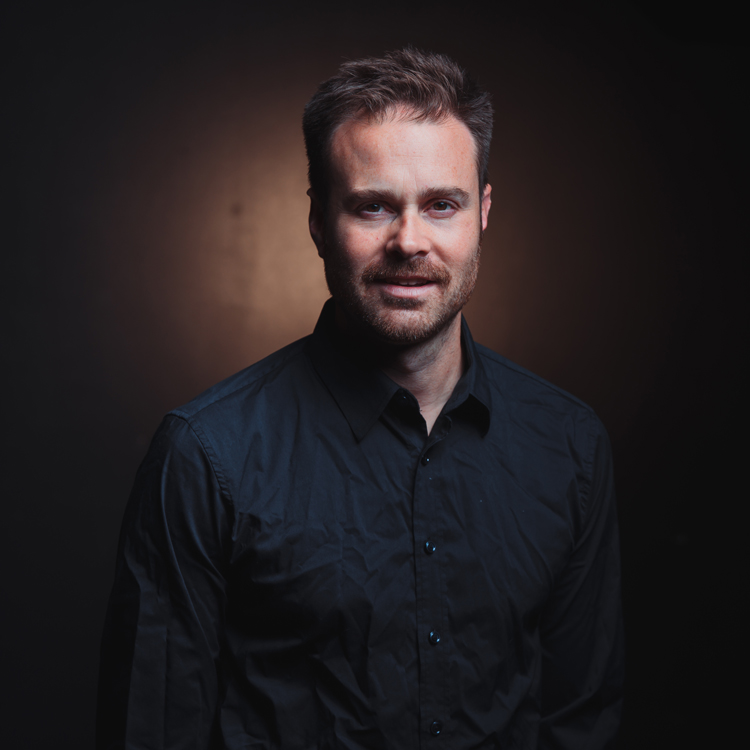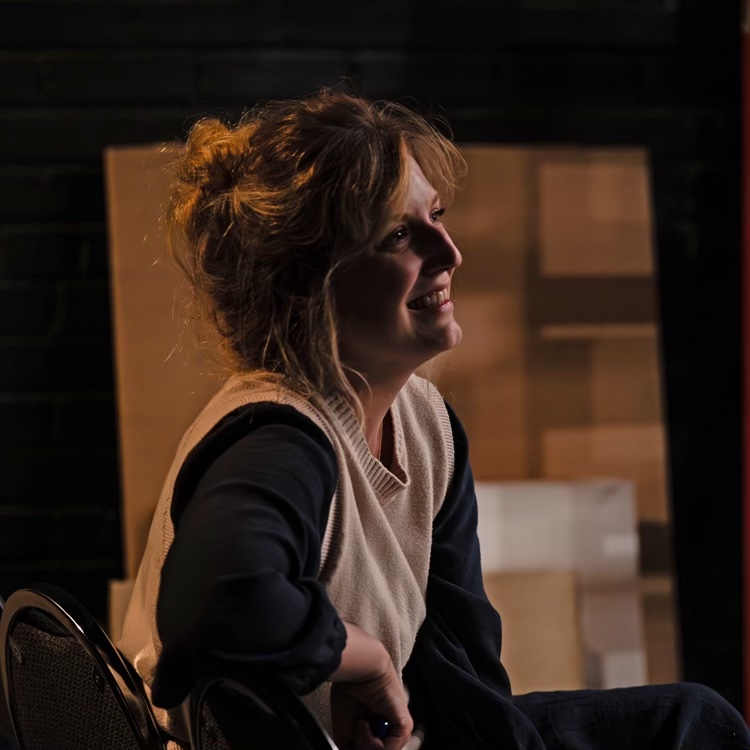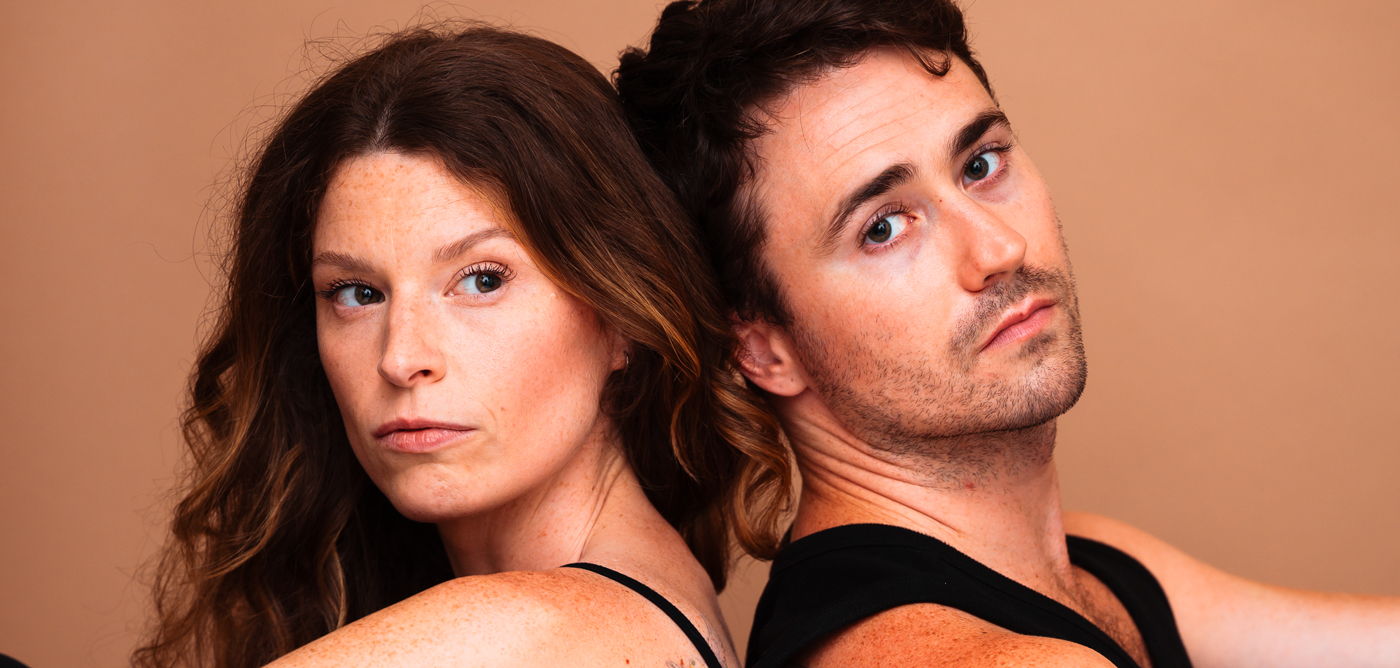 Angels in America cast members Meg Rodgers (l) and Wesley Whitson (Photos by Tasha Gorel)
Angels in America cast members Meg Rodgers (l) and Wesley Whitson (Photos by Tasha Gorel)
When Angels in America opens at the Rec Room this November, Houston audiences will witness something both monumental and intimate. The Pulitzer Prize and Tony Award-winning two-part play by Tony Kushner hasn’t been professionally produced in Houston in more than three decades. For co-directors Matt Hune and Sophia Watt, bringing this seven-hour epic to life inside Rec Room’s 60-seat space is both a challenge and a calling.
“It’s such a layered piece when you take the two plays together as one,” Hune says. “The sheer fact of the imagination involved and just what this play would be like in our space marries with how we’re always looking for the stories that don’t seem, at face value, to quite fit. How can we blow up our space, blow up the story, and use the limitations and confines of what we have to work with to get more creative?”
For Watt, the decision feels both political and spiritual. “Things feel politically pretty unstable at this moment in time, and that can be pretty scary and pretty intense,” she says. “I was really interested in plays that fought back against that and provided a roadmap of hope, challenge, and rigor in the face of systems that want to eradicate you. Angels seemed to fit the bill.”
That urgency—political, emotional, and human—anchors the pair’s approach. “We kept going back to the thought that this is ultimately an epic about what it’s like to change,” Hune adds. “The stages of change are discomfort, suffering a death of some kind, and then whatever newness happens. It’s not comfortable. There is suffering. I think the big picture, culturally, often feels like we’re in this change, so how do we move forward?”
Staging only the second professional Houston production of Kushner’s masterpiece is definitely an immense undertaking. “It’s daunting,” Hune admits.
“Deeply intimidating,” Watt quickly adds.
Still, their sense of reverence for the piece has fueled the rehearsal room. “It feels sacred,” Hune says.
“It’s sacred in the theater canon,” Watt agrees. “There’s a reverence to it, for sure. It’s such a big story, and there’s so much meaning attached to it. I think all the artists in the room treasure this text. Everyone has this feeling of, ‘I can’t believe I get to do this.’ It’s intimidating, and yet it’s extraordinarily playable. In a bizarre way, there’s a simplicity to that excellence.”
Rec Room’s 60-seat venue may seem an unlikely home for a work of such scope, but the directors see it as a return to the play’s roots. “It started out in a place not much bigger than Rec Room,” Watt notes, referring to the play’s original run at San Francisco’s Eureka Theatre. “Reading about Angels’ inception and how they had to get inventive has been helpful.”
Her love of Brechtian theater also shapes the duo’s minimalist approach. “Tony Kushner is riffing off of so many Brechtian principles,” Watt explains. “That lends itself really well to a space like ours—the different ways you can frame the play, and the ways in which seeing the means of production allows you to evaluate our production, as well as to feel its impact.”
 Matt Hune, Rec Room’s artistic director
Matt Hune, Rec Room’s artistic director
“That said, we are busting out walls in our theater,” Hune adds with a grin. “We wanted to play with scale, so when does it get confined, and when do we see the outer limits? We’re not shying away from the idea that we are in a theater and seeing the bones of the theater.”
Hune and Watt have worked together at Rec Room for years, and that familiarity informs their process. “Structurally, although we’re both directing each part, it’s like, ‘Okay, I’ll have my lane in Millennium Approaches, and Sophia is focused on Perestroika,’” Hune explains. “It’s a very collaborative thing. It feels more like we’re workshopping it and seeing what comes from it.”
“Because we’ve worked together for so long, we know we have similar aesthetic and artistic values,” Watt adds. “And weirdly, the flip side of that is you get comfortable disagreeing. It’s not a new relationship, so it’s going to be okay.”
Her admiration for Hune’s “big inventive gestures” is matched by his appreciation of Watt’s attention to detail. “In terms of getting to the microscope and the nit and grit of ‘What is this moment? What’s underneath this moment?’ I love seeing that work,” Hune says.
 Co-director Sophia Watt
Co-director Sophia Watt
For both directors, Kushner’s portrait of America in the Reagan era reverberates loudly in 2025. “We’re now in this ridiculous moment where the governor has ordered Houston to get rid of the rainbow crosswalks in Montrose,” Hune says. “All of this is still so freaking charged in terms of queerness. It’s still relevant.”
“This government and political system just extraordinarily and very intentionally failed a group of people because they decided those people were marginal and unimportant.” Watt digs deeper. “Looking at this current political moment of either intentional neglect or intentional aggression from a government towards different populations feels deeply relevant to me.” Yet, at the center of our shared current tragedy, she finds hope. “The core of these plays is the extraordinary character of Prior, who just continues to fight for life and continues to fight with hope. That gives me so much strength.”
“Prior doesn’t choose comfort,” Hune adds. “He ultimately goes through it. That’s one of the most powerful messages of the play—the importance of doing the hard things.”
Both Millennium Approaches and Perestroika are being rehearsed simultaneously by the company, which is rather unusual.
“It’s a treat because most of the times when these shows are done, they’re done in separate rehearsal processes,” Watt explains. “We’re tracking the whole arc, and that’s been really cool.”
And yes, for those interested, there will be marathon days. “We’ll have dinner in between,” Hune promises.
For Watt, that shared experience between artists and audiences is the ultimate reward. “Bringing people together to present this play, to sit in judgment and to witness, that interests me,” she says. “That’s where love and justice meet.”
Hune nods in agreement. “Sometimes we have to do the hard things that are uncomfortable. But actually, they help us in the long run. And not just us, but also the greater good.”
WHAT: Angels in America Part I: Millennium Approaches and Part II: Perestroika
WHEN: November 8–December 20
WHERE: Rec Room Arts, 100 Jackson St., Suite 130C
Info: recroomarts.org/angels-in-america

